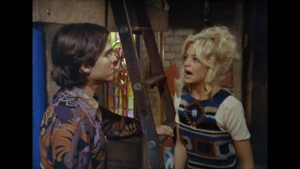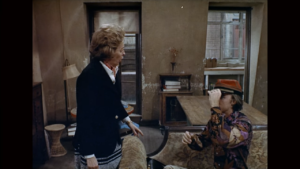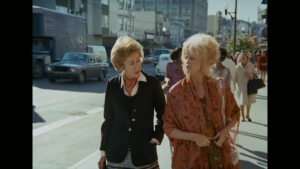Rating: 2.5 out of 5


![]()
Ever since I moved to California, I have seen many more plays. One main reason is that one of my best friends is a theatre major and told me I needed to be more cultured and broaden my mind. I will admit that the plays I have gone to are exciting and entertaining, but I love watching my movies. After starting this movie review sight, I have seen that many movies are made from or influenced by a play. I have never heard of the film Butterflies Are Free. I only watched it because it won an Academy Award for Best Supporting Actress. The film has a play feel to it and seems to be right from the stage. The title should give you a minor clue about the story.

Butterflies Are Free is based on the 1969 play by Leonard Gershe. The film revolves around Don Baker (Albert) and his relationships. Don was born blind and grew up in an upper-middle-class household in Hillsborough, just outside San Francisco, with his mother, Mrs. Baker (Heckart). Mrs. Baker wrote a series of popular children’s books about Little Donny Dark, a blind boy who performs heroic deeds. Wanting independence, Don strikes a deal with his mother to live on his own for two months without her interference. Don moves into his apartment and, after a month, feels alone. His life changes with the introduction of Jill Turner (Hawn). Jill is a nineteen-year-old who was married for six days at the age of sixteen. She moves into the apartment next door to Don. Don and Jill instantly become friends and soon decide to unlock the door that joins their two apartments together. Jill admits that she isn’t really the commitment type. Even though she says this, the two soon become lovers. Things become complicated when Mrs. Baker rolls up to see what Don is doing and discovers a half-dressed Jill walking around. Not liking what is happening, Mrs. Baker tries to chat with Jill and Don. As the issues arise, the three soon find themselves moving in different directions that could change their collective lives and feelings for each other.
I am going to be honest with you. I wasn’t that impressed or entertained by this film. It doesn’t take anything away from the play that it was made after it, but it just didn’t vibe to me as a movie. The whole feel of the film was a glorified play that wasn’t executed that well. The story revolves around the relationship between Don Baker, Jill Tanner, and Don’s mother, Mrs. Baker. Let’s start off with the relationship between Jill and Don. Jill moves in next door to Don. Jill is carefree and seems like an airhead. Don is living on his own for the first time as he is blind. The pair become lovers, and Jill tries to make Don carefree. It is a nice element as one person is looking for their independence, and the other needs to learn about where they are going or what they want in life.

The second relationship is between Don and his mother, Mrs. Baker. You can tell that there is some major tension between the two characters. As Don was born blind, he has been under his mother’s watchful eyes for all his life. Mrs. Baker wrote a series of popular children’s books about Little Donny Dark, a blind boy who performs heroic deeds. Wanting independence, Don makes a contract with his mother for him to live on his own and not interfere/visit him for two months. Don is doing okay until Jill comes and lives next door. His mother disapproves of Jill, but when she sees that Jill hurt her son, she does what any mother would do. Tell his ass to buck up. The ending between this two is a mother letting go and a son finding his way.
A third relationship that needs to be discussed is between Jill and Mrs. Baker. Mrs. Baker is very protective of her son and doesn’t think highly of Jill. Hell, the first time Mrs. Baker met Jill, Jill was parading around in her underwear. Mrs. Baker has a long conversation with Jill about her intentions with her son and her life. Most of the drama in this movie comes from these two conversations. I wouldn’t say it is intense but more like a simple chat.
Regarding the acting, this movie was propelled by the film’s stars. Since it came from a play, the movie’s emphasis was on the characters. Goldie Hawn as Jill Tanner was fun to watch. She played the ditzy blonde who didn’t know what she wanted in life. Hawn was beautiful and pretty much paraded around in her underwear for about 50% of the film. This shouldn’t take away from her performance. She was the free-spirited one that Don opened up to and was the force to really leave the nest.

Edward Albert as Don Baker impressed me. Playing a blind person is complex, and he pulled it off nicely. I really thought he was blind before reading that he has his eyesight in real life. As Don, Albert played him as a young man who wanted to be free from his mother’s “rule.” A person looking for his own independence. I understand where he was coming from. Sometimes I think he was being a little spoiled, but overall, Albert made the performance work.
Eileen Heckart, as Mrs. Baker, was the one that won the Academy Award. Her performance was some of the best parts of the film. It wasn’t that she was an overbearing mother; it was the fact that she wanted her son to be safe and find his own way. She wrote stories for her son to find his own courage. Like any caring mother, she disapproves of Jill and her influence over her son. As any mother, she lets her thoughts known. In the end, she finds her own courage of letting her little boy fly and feel pain on his own.
Overall, Butterflies are free is an okay film. Made after a play, it has that play feel to it. The story is about letting go and growing on all fronts in three different relationships. The film is propelled by the acting abilities of the main characters. Hawn and Albert are okay in their roles, but Heckart is the one who should be commended. Watch this film during a week of watching other movies that are made after plays.